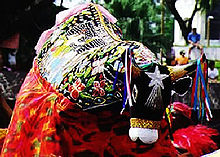
Back Bumba Meu Boi DAG Bumba-meu-boi German Bumba-meu-boi Esperanto Bumba-meu-boi Spanish Bumba-meu-boi Finnish Bumba-meu-boi French בוי HE ブンバ・メウ・ボイ Japanese Bumba-meu-boi Polish Bumba meu boi Portuguese
This article may require cleanup to meet Wikipedia's quality standards. The specific problem is: check for OR, improve references. (June 2018) |
Bumba Meu Boi is an interactive play celebrated in Brazil. It originated in the 18th century. It is a form of social criticism. Lower-class Brazilians mock and criticize those of higher social status through a comedic folklore story told in song and dance. Though not as well known internationally as Carnival and other Brazilian festivals, it is older and deeply rooted in the culture of Brazil. The tale can vary depending on the region and social setting in which it is practiced. However, its essential theme remains the same, with a focus on the death and resurrection of an ox.[1]
The principal figures include an ox, a white master (Cavalo Marinho, in Pernambuco), a black pregnant woman (Catirina), a Vaqueiro or cowboy (Mateus, Chico or Pai Francisco), other vaqueiros (cowboys), índios, índias and caboclos (indigenous people), a priest, and a doctor (or indigenous healers, pajés).[2] The audience is also a key component of the performance, as passionate responses from spectators provide a hectic atmosphere. Additionally, performers are known to become playfully physical with the audience.
Today, Bumba Meu Boi is separated into traditional and modern practices. However, only the traditional forms can be found throughout the country. Both versions can be seen in Brazil from June 13 to 29, as well as from December 25 (Christmas) to January 6.[3]
The Cultural Complex of Bumba-meu-boi from Maranhão was declared Intangible Cultural Heritage of Humanity by UNESCO in December 2019.[4]

- ^ "Brazilian Dramatic Dances: Bumba-meu-boi". maria-brazil.org. Retrieved March 29, 2018.
- ^ Nettl, Bruno; Miller, Terry E.; Stone, Ruth M.; Williams, Sean; Porter, James; Rice, Timothy (1998). The Garland Encyclopedia of World Music: Southeast Asia. Taylor & Francis. ISBN 9780824060404.
- ^ "Boi Bumba". carnaval.com. Retrieved April 13, 2018.
- ^ "Bumba meu boi from Brazil is now an intangible cultural heritage".
© MMXXIII Rich X Search. We shall prevail. All rights reserved. Rich X Search
